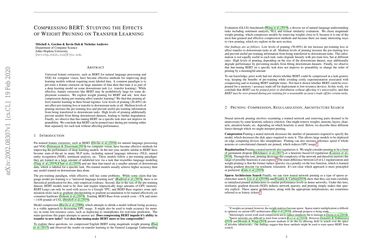Compressing BERT: Studying the Effects of Weight Pruning on Transfer Learning
Pre-trained universal feature extractors, such as BERT for natural language processing and VGG for computer vision, have become effective methods for improving deep learning models without requiring more labeled data. While effective, feature extractors like BERT may be prohibitively large for some deployment scenarios. We explore weight pruning for BERT and ask: how does compression during pre-training affect transfer learning? We find that pruning affects transfer learning in three broad regimes. Low levels of pruning (30-40%) do not affect pre-training loss or transfer to downstream tasks at all. Medium levels of pruning increase the pre-training loss and prevent useful pre-training information from being transferred to downstream tasks. High levels of pruning additionally prevent models from fitting downstream datasets, leading to further degradation. Finally, we observe that fine-tuning BERT on a specific task does not improve its prunability. We conclude that BERT can be pruned once during pre-training rather than separately for each task without affecting performance.
PDF Abstract ACL 2020 PDF ACL 2020 Abstract

 GLUE
GLUE